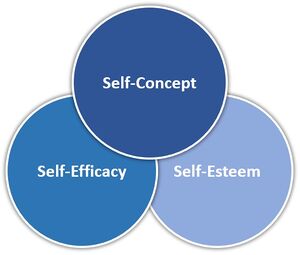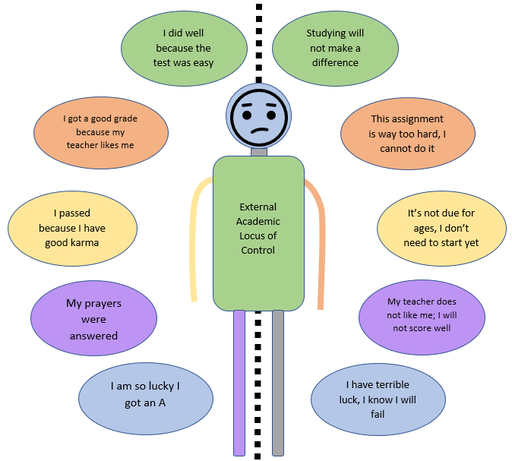Agency (Psychology)
 From Conservapedia
From Conservapedia In psychology, a "sense of agency refers to the feeling of control over actions and their consequences".[1] See also: Self-efficacy
According to Thomas S Bateman D.B.A.:
| “ | Human agency is a mindset plus a set of learnable actions that help us attain what we want in life.
Agency is a psychological concept and comprises four activities: forethought, implementation, self-management, and learning and adapting. "Agentic" is the strongest competence-related mindset, sitting atop a hierarchy including empowered [(Adequate autonomy and support)], competent, passive [(Don't try to improve which can inhibit a growth mindset)], and declining [(Belief that ability to accomplish is diminishing)]... To exercise agency is to acquire significant control over your outcomes in life’s various arenas, including school, work, sports, physical health, and psychological well-being. The Four Pillars of Personal Agency Full-fledged agency requires believing you can achieve your goal and engaging in the following activities: 1. Forethought: deciding to take on a challenge, thinking ahead, setting goals, and making plans. 2. Implementation: taking first steps, enacting plans, and persisting toward success. 3. Self-management: taking care of yourself, dealing with emotions and stress, and maintaining good health to sustain your efforts. 4. Learning and adapting: monitoring progress, rethinking strategies and tactics, and making effective adjustments.[2] |
” |
Contents
The psychologist Albert Bandura on agency[edit]
See also: Social influence and Social intelligence and Self-efficacy
Albert Bandura (December 4, 1925 – July 26, 2021) was a Canadian-American psychologist. He served as a professor of social science in psychology at Stanford University.[3]
Bandura was the originator of social learning theory, social cognitive theory, and the psychological concept of self-efficacy.
According to the psychologist Albert Bandura:
| “ | Agency refers to the human capability to influence one's functioning and the course of events by one's actions. There are four functions through which human agency is exercised. One such function is intentionality. People form intentions that include action plans and strategies for realizing them. The second function involves temporal extension of agency through forethought. People set themselves goals and foresee likely outcomes of prospective actions to guide and motivate their efforts anticipatorily. The third agentic function is self-reactiveness. Agents are not only planners and forethinkers. They are also self-regulators. The fourth agentic function is self-reflectiveness. People are not only agents, they are self-examiners of their own functioning. Through functional self-awareness, they reflect on their personal efficacy, the soundness of their thoughts and actions, the meaning of their pursuits, and make corrective adjustments if necessary.
People exercise their influence through three forms of agency: individual, proxy and collective. In agency exercised individually, people bring their influence to bear on what they can control. In proxy agency, they influence others who have the resources, knowledge, and means to act on their behalf to secure the outcomes they desire. In the exercise of collective agency, people pool their knowledge, skills, and resources and act in concert to shape their future.[4] |
” |
Locus of control[edit]
See also: Locus of control
Locus of control is the "extent to which you feel in control of the events that influence your life."[5]
Internal vs. external locus of control[edit]
According to Kendra Cherry, MSEd:
| “ | If you believe that you have control over what happens, you have what psychologists refer to as an internal locus of control. If you believe that you have no control over what happens and that external variables are to blame, you have what is known as an external locus of control.5
It is important to note that locus of control is a continuum. No one has a 100% external or internal locus of control. Instead, most people lie somewhere on the continuum between the two extremes.[6] |
” |
Christianity teaches the sovereignty of God.[7] But it also teaches that one has free will and that Christians are co-labors with God (1 Corinthians 3:9).
Journal articles[edit]
- What Is the Sense of Agency and Why Does it Matter?, Frontiers in Psychology. 2016; 7: 1272. Published online 2016 Aug 29. doi: 10.3389/fpsyg.2016.01272
- Toward a Psychology of Human Agency by Albert Bandura, Perspectives on Psychological Science. Volume 1, Issue 2. https://doi.org/10.1111/j.1745-6916.2006.00011.x
- Agency for Learning: Intention, Motivation, Self-Efficacy and Self-Regulation, Frontiers in Education, 26 February 2020. Sec. Educational Psychology. Volume 5 - 2020 | https://doi.org/10.3389/feduc.2020.00019
- Motives underlying human agency: How self-efficacy versus self-enhancement affect consumer behavior, Current Opinion in Psychology, Volume 46, August 2022, 101335
Free will in theology and philosophy[edit]
Theology/philosophy:
Philosophy:
- Agency, Stanford Encyclopedia of Philosophy
See also[edit]

Usain Bolt beating Tyson Gay and setting a 100-meter world record at the 2009 World Championships in Athletics in Berlin, Germany.
- Freewill
- Locus of control
- Mindset
- Growth mindset
- Self-motivation
- Motivation
- Habit
- Proactivity
- Planning
- Goal setting
- Results orientation
- Confidence
- Positive thinking
- Self-concept
- Self-esteem
- Core self-evaluations
- Achievement orientation
- Personal development
- Self-talk
- Problem solving
- Skill
- Self-control
- Self-regulation
- Self-awareness
- Mindfulness (Psychology)
- Metacognition
- Grit (personality trait)
- Mental toughness
- Psychological resilience
Opposite concepts:
External links[edit]
- Albert Bandura: Self-Efficacy & Agentic Positive Psychology by Catherine Moore, Psychologist, MBA
- Exploring Autonomy, Locus of Control, and Self-Efficacy, PsychCentral.com
Videos:
- Agency - video playlist
References[edit]
- ↑ What Is the Sense of Agency and Why Does it Matter?, Frontiers in Psychology. 2016; 7: 1272. Published online 2016 Aug 29. doi: 10.3389/fpsyg.2016.01272
- ↑ Agency Is the Highest Level of Personal Competence by Thomas S Bateman D.B.A.
- ↑ "The President's National Medal of Science: Recipient Details | NSF - National Science Foundation". www.nsf.gov.
- ↑ Agency, Albert Bandura website
- ↑ Locus of Control and Your Life
- ↑ Locus of Control and Your Life
- ↑ 10 Key Bible Verses on God’s Sovereignty, Crossway.org
- ↑ How the world’s fastest man Usain Bolt mentally prepares for a race CNBC
Categories: [Psychology] [Sociology]
↧ Download as ZWI file | Last modified: 03/30/2024 16:51:22 | 44 views
☰ Source: https://www.conservapedia.com/Agency_(psychology) | License: CC BY-SA 3.0


 KSF
KSF